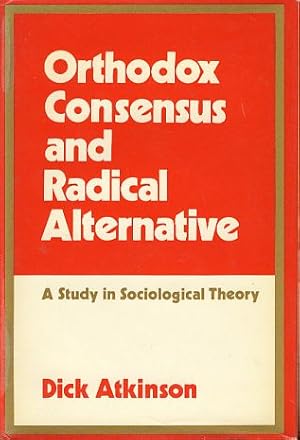9780435820305 - Orthodox Consensus and Radical Alternative von Atkinson OBE, Dick (1 Ergebnisse)
Produktart
- Alle Produktarten
- Bücher (1)
- Magazine & Zeitschriften
- Comics
- Noten
- Kunst, Grafik & Poster
- Fotografien
- Karten
-
Manuskripte &
Papierantiquitäten
Zustand
- Alle
- Neu
- Antiquarisch/Gebraucht
Einband
- alle Einbände
- Hardcover
- Softcover
Weitere Eigenschaften
- Erstausgabe
- Signiert
- Schutzumschlag
- Angebotsfoto
Land des Verkäufers
Verkäuferbewertung
-
Orthodox Consensus and Radical Alternative. A Study in Sociological Theory.
Verlag: London, Heinemann 1971., 1971
ISBN 10: 0435820303ISBN 13: 9780435820305
Anbieter: Fundus-Online GbR Borkert Schwarz Zerfaß, Berlin, Deutschland
Buch
Zustand: Wie neu. Gr. 8°. IX, 307 Seiten. Originalpappband. Umschlag berieben, sonst gutes Exemplar. - This book is a highly controversial study of modern sociological theory. Dick Atkinson argues that the dominant schools of social thought form a consensus. He analyses the work of three of the key figures in the development of modern sociology - Talcott Parsons, Max Weber and Karl Marx - and highlights both the convergent elements and those points of dissent which form a submerged alternative theme in their writings. He suggests that the work of many contemporary writers such as Marcuse, Rex and Dahrendorf have Contributed to the modern consensus so that the mainstream of modern social theory contains an established, orthodox view of society whose implications are deeply conservative. On the other hand, the submerged alternative theme in the work of the founding fathers of modern sociology and the empirical work of such writers -as Laing, Goffman and Gross suggests |;the possibility of another, more adequate sociological theory. The author criticizes 'concepts - such as norm, role, and social structure - and conceptualised processes - such as socialisation and legitimation. He urges that not only must our sociological view of man be redefined and humanised but also our view of the determinants of man's action and relationships must be reshaped. The long, final section of the book sets out to do just this. The person and situational logic, not the actor and role, are the central concepts on which the alternative sociological theory is based. The meaning, not the form, of action is given priority. Such structural concepts as class and status are rejected in favour of new concepts and a new concern - man's constant attempts to shape and control his life situations through his everyday activities. The patterns and meanings of social life are seen as stemming neither from external or internalized structures which impose their imprint on man's actions. Rather, man is seen as the master, and the very concepts of social structure and social system (whether in conflict or cohesion) are jettisoned and replaced. Finally, this leads Dick Atkinson to argue that the 'new sociology' involves a new kind of sociologist and a new kind of sociological activity. The implications are revolutionary for both sociology and politics. Sprache: Englisch Gewicht in Gramm: 550.


